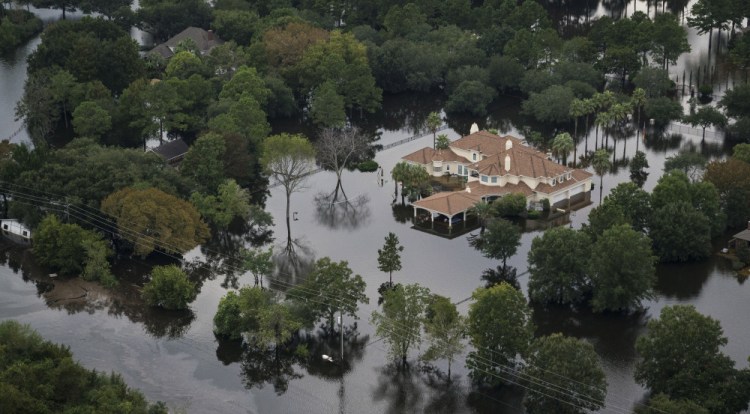NEW ORLEANS — There’s a theme lurking under the giant science meeting here along the Mississippi River: Extreme weather really is getting more extreme because of climate change. The human influence on hurricanes and wildfires is increasingly obvious. For years this has been a subject clouded in uncertainties. But now scientists say they have hard numbers.
Wednesday two independent research teams, one based in the Netherlands and the other in California, reported that the deluge from Hurricane Harvey was significantly heavier than it would have been before the era of human-caused global warming. One paper put the best estimate of the increase in precipitation at 15 percent. The other said climate change increased rainfall by 19 percent at least – with a best estimate of 37 percent.
Meanwhile another team of scientists released a blockbuster report on extreme weather in 2016, saying they could declare that three weather events -– the weirdly warm “blob” of water off the Alaska coast, a heat wave in Asia and the highest-ever global temperature – would have been impossible without human-caused climate change.
“This is the first time we’ve ever had statements like that,” said Stephanie Herring, a climate scientist with the National Oceanic and Atmospheric Administration who spoke here at the fall meeting of the American Geophysical Union (AGU) Wednesday. And about that “blob”: “It’s still sitting there.”
“Attribution” research, as it’s known, seeks to find and quantify the influence of climate change on a weather event, which has always been problematic. There’s a truism: Climate is what you expect and weather is what you get. Weather events emerge from chaotic forces and elements, and there is variability from place to place and year to year.
The result has been an ongoing issue for scientists studying extreme weather and journalists reporting on the subject. Definitive statements about causality, or the magnitude of an effect, are hard to come by. The discussion gets mired in caveats, because extreme events can happen with or without a changed climate.
That’s changing.
There’s a buy-more-sandbags message lurking amid the sessions here at the AGU meeting. As of Wednesday morning 22,500 people had registered and more are coming in, including experts on volcanoes, earthquakes, glaciers, the atmosphere, Mars, Jupiter and so on.
Extreme weather is a familiar topic here in the Crescent City. At one panel Wednesday a city planner warned that the flood control infrastructure is nowhere near adequate for the perils ahead. Many scientists have urged that the government improve flood maps – they’re out of date and no longer capture the new reality of the warmer world.
“They have not been improving the maps as they should. They’re treating that as static,” said Columbia University research professor Suzana Camargo.
The meeting had numerous sessions Wednesday devoted to late-breaking research on hurricanes Harvey, Irma and Maria. Scientific research usually takes longer to cohere, but 2017 was an astonishing year of natural disasters and many people dropped what they were doing to tease out early findings about the hurricanes and other tumult, including western U.S. wildfires.
Hurricane Harvey hit the Texas coast near Corpus Christi on Aug. 25 after it intensified rapidly in the Gulf of Mexico. The storm then stalled and dropped record rains for the better part of a week on southeast Texas before finally drifting north and dissipating. The storm flooded Houston and much of the region and was one of several hurricanes that slammed the United States during a volatile 2017 season, including Hurricane Irma in Florida and Hurricane Maria in Puerto Rico.
“Climate change made this event more likely and heavier,” said Karin van der Wiel, a researcher at the Royal Netherlands Meteorological Institute.
Van der Wiel and her colleagues concluded that a deluge such as Harvey would have occurred in the region once every 2,400 years in the pre-warming period, but that it is now a 1-in-800 year event – and is becoming more likely.
Copy the Story LinkSend questions/comments to the editors.



Success. Please wait for the page to reload. If the page does not reload within 5 seconds, please refresh the page.
Enter your email and password to access comments.
Hi, to comment on stories you must . This profile is in addition to your subscription and website login.
Already have a commenting profile? .
Invalid username/password.
Please check your email to confirm and complete your registration.
Only subscribers are eligible to post comments. Please subscribe or login first for digital access. Here’s why.
Use the form below to reset your password. When you've submitted your account email, we will send an email with a reset code.